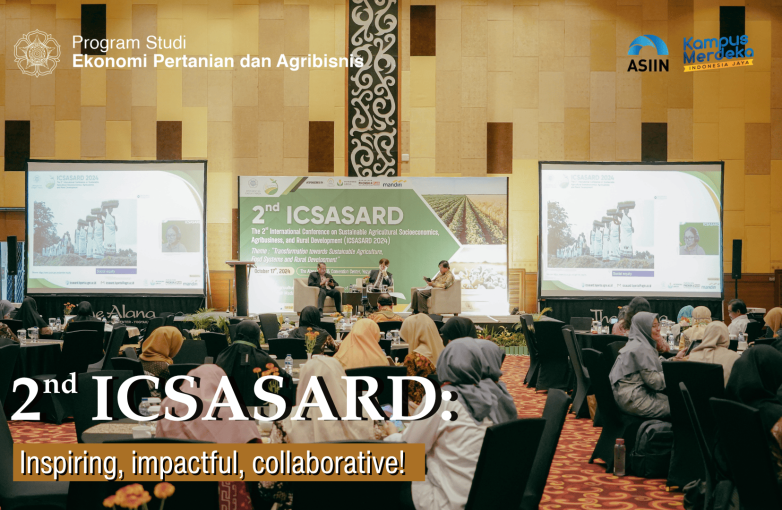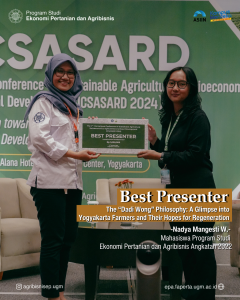
On October 17, 2024, the Department of Agricultural Socioeconomics, Faculty of Agriculture, Universitas Gadjah Mada (UGM) held the second International Conference on Sustainable Agricultural Socioeconomics, Agribusiness, and Rural Development (ICSASARD). This international conference was held to support the transformation of essential sectors to create a sustainable, resilient, and prosperous society.
ICSASARD 2024 covers 7 issues, including
1. Low Emission Development (LED) for sustainable agriculture
2. Information, Communication and Technology (ICT) for sustainable agriculture
3. Climate change and natural resources resilience for food systems
4. Sustainable food value chain
5. Food and nutrition security
6. Social transformation towards sustainable food system
7. Inclusive Rural Development
Academics welcomed ICSASARD 2024. This can be seen from the seminar participants who came from various countries, including Mozambique, the Philippines, Indonesia, Australia, Ecuador, Hungary, and Japan. In addition, the speakers at ICSASARD were academics from various countries including Japan, Australia, Germany, Malaysia, and Indonesia.

One of the students in the Agricultural Economics and Agribusiness Study Program at UGM became the best presenter. Nadya Mangesti succeeded in becoming the best presenter in the Inclusive Rural Development class with her presentation entitled “The “Dadi Wong” Philosophy: A Glimpse into Yogyakarta Farmers and Their Hopes for Regeneration”. Nadya studied the perception of parents in farming households towards agriculture as a profession for their children based on the Javanese philosophy of “dadi wong” in Serat Wedhatama and developed a strategic model to support farmer regeneration.
The implementation of The 2nd ICSASARD is a form of implementation of several points of the sustainable development goals (SDGs), including:
1. SDGs 1: no poverty.
2. SDGs 2: no hunger.
3. SDGs 3: healthy and prosperous lives.
4. : SDGs 4: quality education.
5. SDGs 7: clean and affordable energy.
6. SDGs 8: decent work and economic growth.
7. SDGs 10: reduced inequality.
8. SDGs 11: sustainable cities and settlements.
9. SDGs 12: responsible consumption and production.
10. SDGs 13: addressing climate change.
